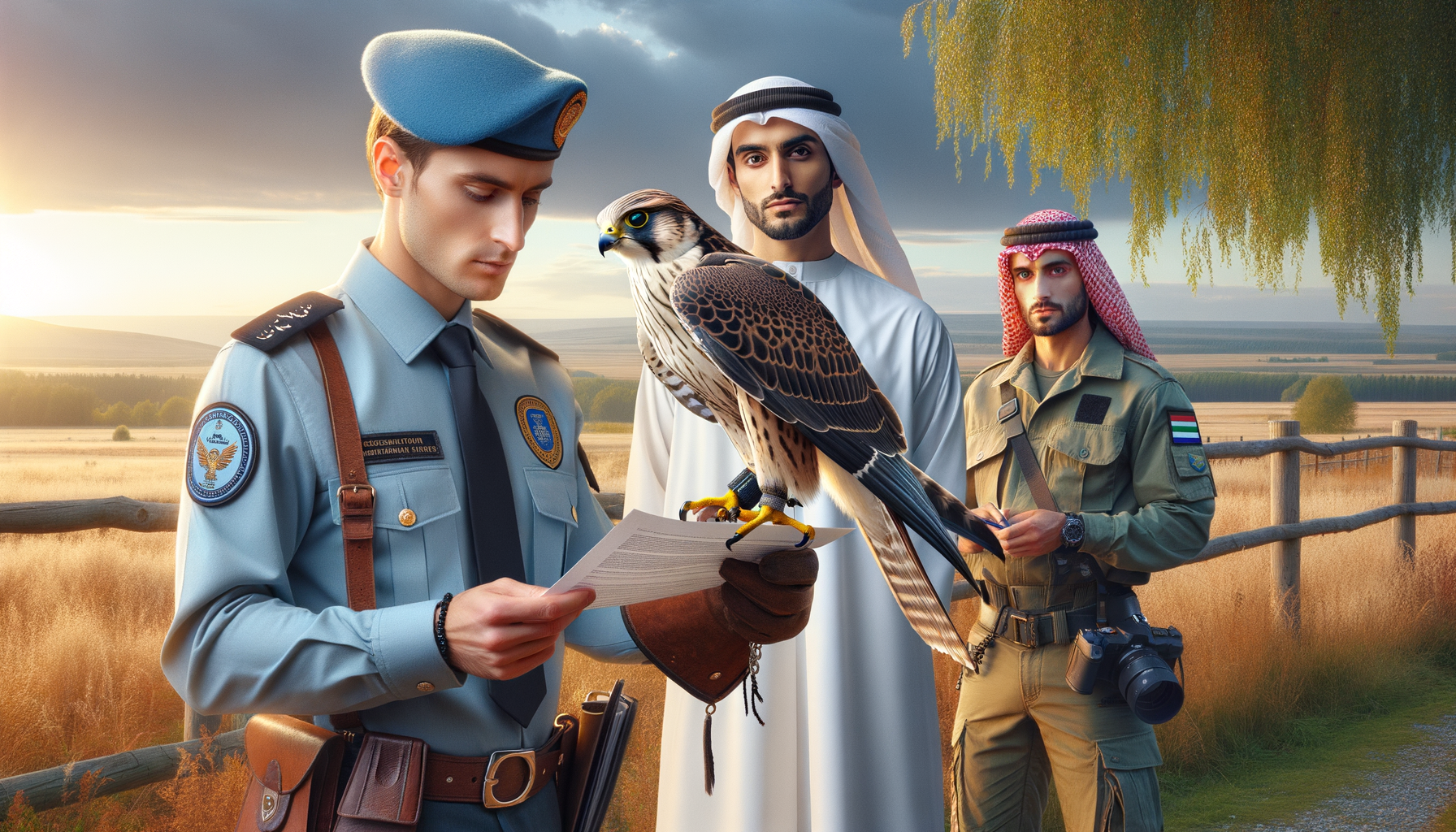Key Legal Aspects of Falconry
- Permits and Licenses: Essential to have the proper permits and licenses to legally practice falconry.
- Training Requirements: Undertake extensive training and pass exams to show knowledge and skills.
- Proper Housing: Ensure proper housing for birds of prey to meet legal standards.
- Wildlife Protection: Comply with laws protecting wildlife and preventing illegal trade.
- Ethical Treatment: Follow ethical guidelines to ensure the humane treatment of birds.
- Recordkeeping: Keep thorough records of falconry activities as required by law.
- Inspections: Be prepared for regular inspections by authorities to ensure compliance.
- Transport Regulations: Adhere to specific regulations when transporting birds of prey.
Unraveling the Legal Side of Falconry: A Journey of Respect and Responsibility
Imagine you’re in the Irish countryside, exploring the lush green fields and ancient castles. Suddenly, you spot a majestic falcon soaring high above, gliding effortlessly on the wind. Just like a wise old storyteller weaving tales of the past, falconry has its own rich and fascinating history, rooted deep in tradition and culture. But, much like any ancient craft, it’s not just about the romance and skill; it also involves responsibilities and rules that protect both the birds and the people who train them.
Here at Learn Falconry, we’re passionate about sharing everything you need to know to embark on this enchanting pursuit. In this article, we’ll guide you through the intricate legal landscape of falconry. At first glance, all these laws and regulations may seem as dense as an old Irish folktale, but just like those stories, there’s wisdom and necessity behind them.
So why is it important to keep reading? Because understanding these regulations is fundamental to practicing falconry safely and ethically. Just as you’d respect the customs and lore of the Irish countryside, respecting the legal aspects of falconry ensures the protection and well-being of these magnificent creatures and helps preserve this noble tradition for future generations.
Dive in with us, and let’s make sense of the legal aspects of falconry together. You’ll soon see why these guidelines are not just rules to follow but a crucial part of the falconry experience that enhances your journey and brings you closer to these incredible birds of prey.
Understanding Falconry Laws and Regulations Worldwide
Falconry is an ancient practice that involves training birds of prey to hunt small animals in their natural environment. For fans and practitioners of falconry, understanding falconry laws and falconry regulations worldwide is crucial. These laws help protect birds, their trainers, and the environment. Let’s dive into the different aspects of falconry laws and the controversial discussions around this age-old sport.
Falconry Regulations Worldwide
The rules for falconry differ depending on where you are in the world. In some countries, falconry is highly regulated, while in others it is less so. Falconers must know the falconry regulations worldwide that apply to their location to ensure they are in compliance with local and international laws.
- North America:
In the United States, falconry regulations are strict, requiring potential falconers to pass exams and obtain specific permits. The management of these laws is shared between state wildlife agencies and the U.S. Fish and Wildlife Service. Visit our Falconry in North America page for more detailed information. In contrast, Canada has its own set of regulations, which vary by province. - Europe:
European countries often have well-established rules for falconry. For example, the United Kingdom requires both a license to keep birds of prey and additional permits to trap wild birds. France, Spain, and Germany have their unique regulations, often guided by European Union directives. - Middle East:
Falconry is a celebrated cultural heritage in many Middle Eastern countries, such as the UAE and Saudi Arabia, where the sport has evolved with both traditional and modern practices. Learn more about cultural impacts on falconry here. - Other Regions:
Countries like Australia and South Africa also have specific falconry regulations. In Australia, you must be part of a recognized falconry club to practice the sport, and in South Africa, falconers adhere to strict conservation laws.
Falconry Permits Worldwide
Before you can practice falconry, you must obtain the necessary falconry permits worldwide. These permits ensure that falconers are trained, responsible, and respectful of wildlife. The permit process varies, but it generally involves rigorous testing and demonstrating a commitment to ethical practices.
- Types of Permits:
Permits can vary based on the experience level of the falconer. Beginner falconers usually start with apprentice permits, advancing to general and master permits as they gain experience. Some countries require additional certifications, particularly for the possession and transportation of certain bird species. - Renewal and Compliance:
Many countries also require regular renewal of permits, ensuring ongoing compliance with local laws. This renewal may include inspections and continued education credits.
Check out our guides on Falconry Licensing Requirements and International Falconry Regulations for more insights.
What is the Controversy with Falconry?
Falconry, like many ancient practices, faces some controversy. People debate whether falconry is ethical and its impact on wildlife conservation. Let’s look at a few key points of contention:
- Animal Welfare Concerns:
Some argue that training birds for sport can be stressful and potentially harmful. Ethical falconers prioritize the health and well-being of their birds, adhering to strict animal welfare laws. Read more on Animal Welfare in Falconry. - Conservation Issues:
Opponents worry about the impact on local wildlife populations, particularly when it comes to trapping wild birds. However, falconry also plays a significant role in conservation efforts. Falcons that are bred and trained responsibly can contribute to the survival of certain species. Our Falconry and Conservation page offers a deeper dive into these efforts. - Legal and Ethical Violations:
Cases of illegal hunting or the improper care of birds can give falconry a bad reputation. Falconry’s advocates work tirelessly to highlight ethical practices and educate the public on responsible falconry.
For more information, visit our resources on Ethical Falconry and Legal Challenges in Falconry.
By understanding the diverse laws and addressing the controversies, falconers can help preserve and sustain this ancient art for future generations. Stay informed and join the global community of responsible falconers today!
Understanding the Legal Aspects of Falconry
Falconry is a fascinating and ancient sport, but it’s also regulated by various laws to protect both the birds of prey and the environment. Let’s delve into some of the key legal requirements and regulations governing falconry in various parts of the world.
Ohio Falconry Laws
Here’s what you need to know if you’re in Ohio:
- Age Requirement: To hold a general class falconry permit, you must be at least 16 years old.
- Experience Requirement: You need at least two years of experience to qualify for a general class permit.
- Facility Inspection: Falconry facilities and raptors can be inspected by the Division of Wildlife, but only with the property owner’s consent.
- Raptor Care: As a permit holder, you must have all necessary equipment for maintaining your raptor, including jesses, leashes, swivels, a bath container, and scales for weighing.
- Marker Requirement: Raptors must be marked immediately upon acquisition.
- License Cost: A three-year falconry permit costs $75, with an additional $25 annual fee.
New York Falconry Laws
These are the key requirements for falconry in New York:
- Age Requirement: Applicants for a general falconer license must be at least 18 years old.
- Experience Requirement: To become a master falconer, you need at least four months of annual hunting with a raptor as an apprentice and at least three years of annual hunting as a general falconer.
- License Expiration: Licenses expire on December 31, five years after issuance.
- Annual Reporting: Falconers must submit an annual report by December 31 each year.
- Falconry Database: Note that the 3-186A Falconry database will be down for improvements from August 1 to August 3, 2023.
General Requirements for Falconry
There are common requirements across many jurisdictions:
- Falconry Examination: You need to pass an exam with a score of 80% or higher.
- Sponsorship: You must find a general or master class falconer to sponsor your application.
- Facility Construction: Falconers must construct a mew or weathering area and obtain the necessary equipment.
- Hunting License: A current year hunting license is a must for falconers.
Legal Framework for Falconry Worldwide
In 2024, falconry laws are being updated globally to ensure the well-being of raptors:
| License Type | Experience Requirement | Raptors Allowed |
|---|---|---|
| Apprentice License | Sponsorship by a master or general falconer | 1 raptor |
| General License | At least 2 years as an apprentice | Up to 3 raptors |
| Master License | At least 5 years as a general falconer | Up to 13 raptors |
- Reporting and Record-Keeping: Falconers must submit detailed annual reports on their activities, including acquisitions, captures, releases, and banding of birds.
- Abatement Activities: Master falconers can use raptors for activities such as scaring wildlife but need specific permits.
- Licensing Fees: Fees range from $40 to $200, depending on the jurisdiction and license level.
- Membership and Subscription: Membership in organizations like the International Association for Falconry and Conservation of Birds of Prey (IAF) is generally limited to formal falconry groups, but individuals can subscribe.
Ethical Concerns
Falconry involves using living birds, raising ethical questions about their well-being:
- Captivity and Training: Birds may be taken from the wild and trained using methods that alter their natural behavior.
- Living Conditions: Some birds live in confined spaces or are tethered for long periods, which can cause stress.
- Use for Entertainment: Public displays can disrupt natural behaviors and cause stress for the birds.
- Regulations and Enforcement: Varying laws and enforcement mechanisms can lead to exploitation and illegal activities.
- Ethical Considerations: Opinions vary on whether falconry is beneficial or harmful to the birds, raising calls for stricter regulations and better practices.
Understanding these laws and guidelines is crucial for anyone interested in practicing falconry, ensuring the protection of these magnificent birds and the preservation of this ancient sport.
Falconers must ensure adequate care and living conditions for their raptors.
| **Regulation** | **Description** |
|-------------------------|---------------------------------------------------------------------------------|
| Falconry Examination | Written test with a passing score of 80% or higher. |
| Facility Construction | Specific building and facility requirements must be met for raptor housing. |
| License Duration | Usually every 5 years with specific renewal procedures. |
| International Regulations| The IAF promotes conservation and ethical falconry practices worldwide. |
Stay informed and compliant with these essential legal aspects of falconry!
Navigating the Legalities of Falconry in 2024
Falconry, the ancient art of hunting with birds of prey, is a practice steeped in tradition and requires a deep understanding of various regulations and legal aspects. As we venture into 2024, it’s vital to be aware of the following key points to ensure compliance and preserve the welfare of these magnificent creatures:
- Licenses and Permits: Different types of licenses are available, from Apprentice to Master, each with specific requirements, such as sponsorship and years of experience. Staying updated on the licensing process for your region is crucial.
- Age and Experience: Regulations such as Ohio’s requirement for general class holders to be at least 16 years old, and New York’s stipulation of a minimum of three years for a master falconer license, highlight the importance of experience and maturity in falconry.
- Facility Standards: Proper housing and equipment are essential. Falconers must construct suitable mews and weathering areas, ensuring raptors have adequate food, shelter, and veterinary care.
- Reporting and Records: Regular reporting, like the annual reports due in New York, and careful record-keeping of all activities, including acquisitions and releases, are mandatory to maintain transparency and uphold legal standards.
- Exam Requirements: Passing a rigorous falconry examination, with a minimum score of 80%, showcases a falconer’s knowledge and readiness to responsibly care for their raptors.
Being well-versed in these legal aspects and adhering to national and state regulations is paramount for anyone looking to practice falconry. This ensures the safety and longevity of the tradition, while also promoting the welfare of these incredible birds. Whether you’re a seasoned falconer or an aspiring apprentice, understanding and following these guidelines will help you navigate the fascinating world of falconry with confidence and responsibility.




